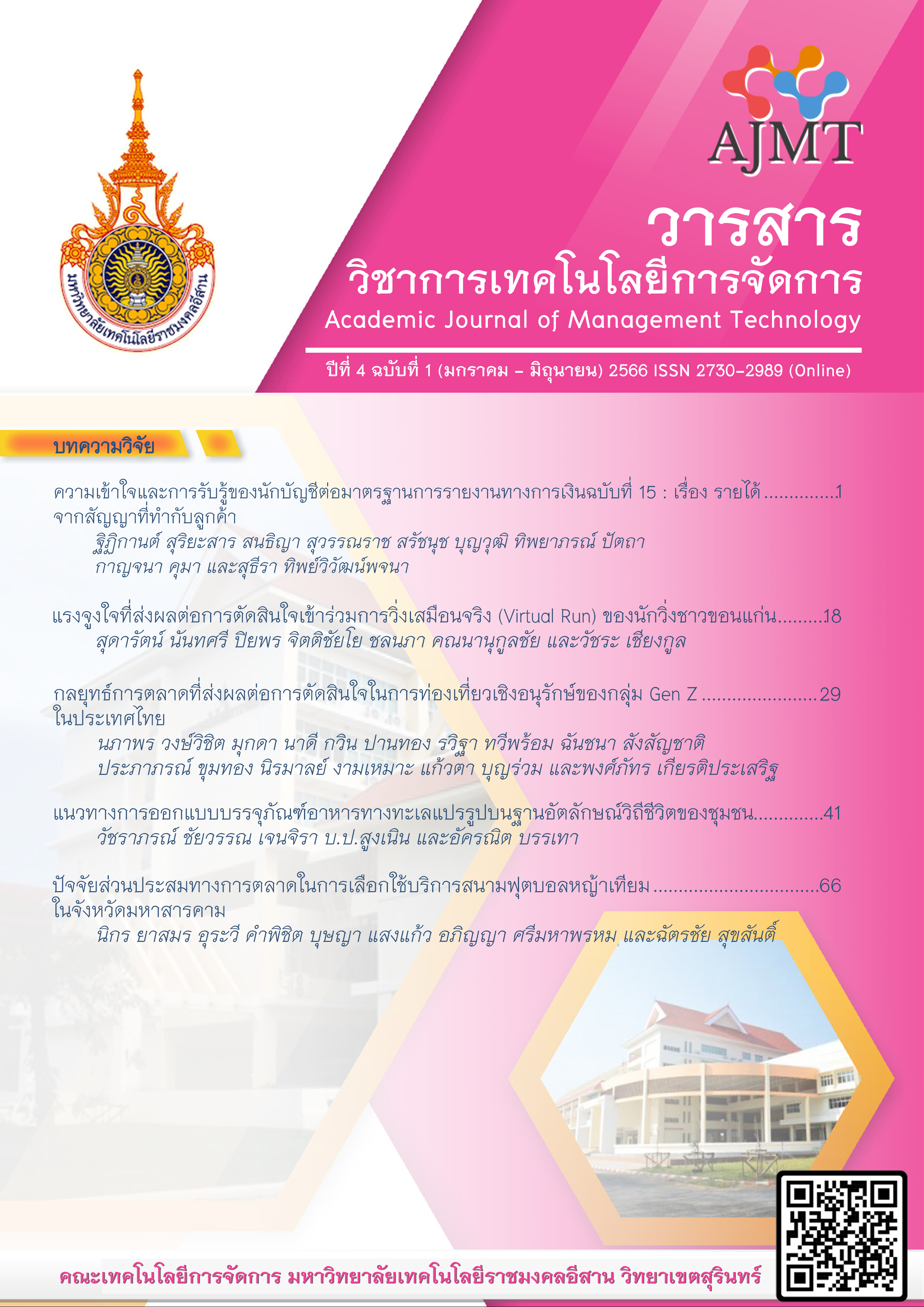แรงจูงใจที่ส่งผลต่อการตัดสินใจเข้าร่วมการวิ่งเสมือนจริง (Virtual Run) ของนักวิ่งชาวขอนแก่น
DOI:
https://doi.org/10.14456/ajmt.2023.2คำสำคัญ:
การจัดงานด้านกีฬา , การวิ่งเสมือนจริง , แรงจูงใจบทคัดย่อ
ปัจจุบันมีการวิจัยจำนวนมากที่ศึกษาเกี่ยวกับแรงจูงใจในการเข้าร่วมการจัดงานกีฬาด้านการวิ่ง เช่น มาราธอน ไตรกีฬา ฯลฯ แต่อย่างไรก็ตามการวิจัยเฉพาะกลุ่มด้านการเข้าร่วมงานวิ่งเสมือนจริง (Virtual Run) ยังคงมีอยู่อย่างจำกัด การวิจัยนี้จึงมีวัตถุประสงค์เพื่อศึกษาแรงจูงใจที่ส่งผลต่อการตัดสินใจเข้าร่วมงานวิ่งเสมือนจริงของนักวิ่งชาวขอนแก่น การวิจัยครั้งนี้เป็นการวิจัยเชิงปริมาณ เก็บข้อมูลโดยใช้แบบสอบถามจากกลุ่มตัวอย่างนักวิ่งชาวขอนแก่น จำนวน 400 คน โดยใช้วิธีการสุ่มตัวอย่างแบบเจาะจง สถิติที่ใช้ในการวิเคราะห์ข้อมูลได้แก่ ค่าเฉลี่ย ส่วนเบี่ยงเบนมาตรฐาน สัมประสิทธิ์สหสัมพันธ์ และการวิเคราะห์การถดถอยพหุคูณ ผลการวิจัยพบว่า ปัจจัยทาง ด้านความสนุกสนานและด้านความท้าทายส่งผลต่อการตัดสินใจของนักวิ่งชาวขอนแก่นในการเข้าร่วมงานวิ่งเสมือนจริง ซึ่งงานวิจัยชิ้นนี้จะเป็นประโยชน์กับผู้จัดงานในการออกแบบการจัดงานให้สอดรับกับแรงจูงใจของผู้เข้าร่วมงาน
เอกสารอ้างอิง
ทรงศักดิ์ รักพ่วง. (2552). การวิ่งมาราธอนในไทย : เครือข่ายทางสังคมและความท้าทายในศตวรรษที่ 21. วารสารร่มพฤกษ์ มหาวิทยาลัยเกริก, 31(1), 7-17.
พี ธนโชติ. (2564). รู้จัก WIRTUAL แอปพลิเคชันสำหรับจัดงาน Virtual Run สำหรับองค์กร ใช้งานง่ายจบได้ในแอปเดียว. [เว็บไซต์]. สืบค้นจาก https://thegrowthmaster.com/trends/wirtual-application-for-organization-virtual-run-events
สำนักงานส่งเสริมการจัดประชุมและนิทรรศการ (องค์การมหาชน). (2556). ทีเส็บ จับมือ ขอนแก่น เปิดประตูสู่ไมซ์ซิตี้แห่งภาคอีสาน รองรับศูนย์กลางอินโดจีน-จีนตอนใต้. [เว็บไซต์]. สืบค้นจาก https://www.businesseventsthailand.com/th/press-media/news-press-release/detail/373-tceb-welcomes-khon-kaen-as-thailands-northeastern-mice-city-opening-opportunities-as-indochina-and-southern-chinas-convention-and-exhibition-hub
Bayih, B. E., & Singh, A. (2020). Modeling domestic tourism: motivations, satisfaction and tourist behavioral intentions. Heliyon, 6(9), e04839.
Bazzanella, F., Peters, M., & Schnitzer, M. (2019). The perceptions of stakeholders in small-scale sporting events. Journal of Convention & Event Tourism, 20(4), 261-286.
Bell, E., Harley, B., & Bryman, A. (2018), Business Research Methods. Oxford University Press.
Blythe, D. A., & Király, F. J. (2016). Prediction and quantification of individual athletic performance of runners. PLoS One, 11(6), e0157257.
Duan, Y., Liu, B., & He, Y. (2020). Study on relationships among sports spectator motivations, satisfaction and behavioral intention: empirical evidence from Chinese marathon. International Journal of Sports Marketing and Sponsorship, 21(3), 409-425.
Duran, E., & Hamarat, B. (2014). Festival attendees’ motivations: the case of International Troia Festival. International Journal of Event and Festival Management, 5(2), 146-163.
Hair, J. F., Black, W. C., Babin, B. J. and Anderson, R. E. (2010). Multivariate Data Analysis (7th ed.). Upper Saddle River, NJ: Prentice Hall.
Han, J. H., Kim, J. S., Lee, C. K., & Kim, N. (2019). Role of place attachment dimensions in tourists’ decision-making process in Cittáslow. Journal of Destination Marketing & Management, 11, 108-119
Jenkins, R. (2023). 5 Reasons to Run Virtual Races. [Website]. Retrieved from https://www.virtualrunningclub.com/blog/5-reasons-to-run-virtual-races/
Kock, F., Josiassen, A., & Assaf, A. G. (2018). On the origin of tourist behavior. Annals of Tourism Research, 73(C), 180-183. doi:10.1016/j.annals.2018.04.002
Malchrowicz-Mos’ko, E., & Poczta, J. (2018). Running as a form of therapy. Socio- psychological functions for mass running events for men and women. International Journal of Environmental Research and Pub-lic Health, 15(10), 2262.
Malchrowicz-Mos’ko, E., Castañeda-Babarro, A., & Guereño, P. L. (2020). On the way to the Marathon—motivation for participating in mass running events among children and adolescents: results of the Poznan half marathon pilot study. International Journal of Environmental Research and Public Health, 17(14), 5098.
Meeprom, S., & Dansiri, W. (2021). Understanding motives for attending charity sport events in Thailand. International Journal of Culture, Tourism and Hospitality Research, 15(1), 26-42.
Miller, J. A. (2020). The Rise of Virtual Races. [Website]. Retrieved from https://www.nytimes.com/2020/04/04/well/move/the-rise-of-virtual-races.html
Nikolaidis, P. T., Chalabaev, A., Rosemann, T., & Knechtle, B. (2019). Motivation in the athens classic mara-thon: The role of sex, age, and performance level in Greek recreational marathon runners. Interna-tional Journal of Environmental Research and Public Health, 16(14), 2549.
Poczta, J., & Malchrowicz-Mos’ko, E. (2018). Modern running events in sustainable development – more than just taking care of health and physical condition (Poznan half marathon case study). Sustaina-bility, 10(7), 2145.
Portugal, J. P., Correia, A., & Águas, P. (2022). Decisions on participation in music festivals: an exploratory research in Portugal. International Journal of Event and Festival Management, 13(2), 164-181.
Randall, A. (2023). 15 Best Virtual Runs, Races & Challenges. [Website]. Retrieved from https://revelsports.com/best-virtual-runs-and-races/
Ronkainen, N. J., Shuman, A., Ding, T., You, S., & Xu, L. (2018). ‘Running Fever’: understanding runner identities in Shanghai through turning point narratives. Leisure Studies, 37(2), 211-222.
Tabachnick, B. G., & Fidell, L.S. (2018). Using Multivariate Statistics (7th ed.). Boston: Allyn and Bacon.
Valek, N. S., Lesjak, M., Bednarik, J., Gorjanc, M., & Axelsson, E. P. (2015). Identifying the runners at 1st Istrian Marathon using CHAID analyses. Kinesiologia Slovenica, 21(2), 51-62.
Verhagen, E., Warsen, M., & Bolling, C. S. (2021). ‘I JUST WANT TO RUN’: how recreational runners per-ceive and deal with injuries. BMJ Open Sport & Exercise Medicine, 7(3), e001117.
ดาวน์โหลด
เผยแพร่แล้ว
รูปแบบการอ้างอิง
ฉบับ
ประเภทบทความ
สัญญาอนุญาต
ลิขสิทธิ์ (c) 2023 คณะเทคโนโลยีการจัดการ มหาวิทยาลัยเทคโนโลยีราชมงคลอีสาน วิทยาเขตสุรินทร์

อนุญาตภายใต้เงื่อนไข Creative Commons Attribution-NonCommercial-NoDerivatives 4.0 International License.
บทความที่ได้รับการตีพิมพ์เป็นลิขสิทธิ์ของคณะเทคโนโลยีการจัดการ มหาวิทยาลัยเทคโนโลยีราชมงคลอีสาน วิทยาเขตสุรินทร์
ข้อความที่ปรากฏในบทความแต่ละเรื่องในวารสารวิชาการเล่มนี้ เป็นความคิดเห็นส่วนตัวของผู้เขียนแต่ละท่านไม่เกี่ยวข้องกับคณะเทคโนโลยีการจัดการ มหาวิทยาลัยเทคโนโลยีราชมงคลอีสาน วิทยาเขตสุรินทร์ และคณาจารย์ท่านอื่นๆในมหาวิทยาลัยฯ แต่อย่างใด ความรับผิดชอบองค์ประกอบทั้งหมดของบทความแต่ละเรื่องเป็นของผู้เขียนแต่ละท่าน หากมีความผิดพลาดใดๆ ผู้เขียนแต่ละท่านจะรับผิดชอบบทความของตนเองแต่ผู้เดียว










